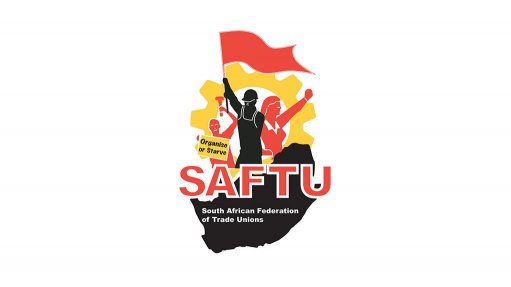
The South African Federation of Trade Unions has noted with grave concern a press release from National Minimum Wage Research Initiative at the University of the Witwatersrand on 14 May 2018.
The Parliamentary Labour Portfolio Committee reconvened on Wednesday 9 May 2018 to consider amendments to the National Minimum Wage (NMW) Bill and further amendments to the Basic Conditions of Employment Act (BCEA) and Labour Relations Act (LRA).
The PC, after listening to Saftu and others on 17 April 2018, decided to refer the bills back to the Department of Labour (DoL) with a mandate to redraft them, taking into consideration all submissions and the deliberations of the Portfolio Committee.
Saftu demanded the scrapping all these pieces of legislation as they legitimise a poverty minimum wage and undermine workers’ and trade unions’ independence and democratic rights.
The federation is however angered that the DoL has totally ignored the submission we made to the Portfolio Committee. We believe that the department is hell-bent on pushing through its own policies and ignoring any contrary views.
The Wits report reveals that Saftu’s is not the only submission to have been disregarded, and that the DoL has, in a number of instances, ignored either the letter or spirit of decisions taken by the Portfolio Committee itself.
It argues that the department’s selective presentation of certain issues to the Portfolio Committee suggests a pursuit of particular outcomes that ignore critical concerns raised by the public and social partners, and thereby undermines the ability of the Committee to conduct a balanced engagement on the Bills before them.
This, they say, comes on top of the DoL’s sidelining of a number of aspects of the February 2017 NMW Nedlac agreement between the social partners. In key instances they have weakened the protections the NMW seeks to provide workers.
This is reinforced by Dr Gilad Isaacs, coordinator of the Wits National Minimum Wage Research Initiative, who has noted that: “the manner in which the Department of Labour has used the Parliamentary process to advance its own preferred outcomes cannot go un-noted.”
Although Saftu’s own concerns are very different from those of Dr Isaacs, we agree with him that the Department’s amendments undermine the instruction from the Portfolio Committee to reinstate the role of sectoral determinations (SDs), they ignored the agreement to include the two-year deadline by which the lower domestic and agricultural worker levels must be raised to the NMW (subject to research not indicating otherwise), and reduce the independence of the NMW Commission.
In other words, the latest draft is even worse that the sell-out deal agreed to at Nedlac by government, business and sweetheart unions.
Dr Isaacs calls on all those involved, in both Parliament and Government, to amend the Bills to ensure they offer maximum protection to workers and a strong, independent and well-resourced Commission to oversee this critical policy intervention.
Saftu however believes strongly that even if all the changes proposed by Dr Isaacs were incorporated into the Bill, it would still be totally unacceptable, as the hourly minimum wage levels it stipulates - R20, R18, R15 and R11 are poverty wages on which no-one should be expected to live.
They fall below what Isaacs himself defined in 2016 as the working-poor line of R4,125 below which workers cannot meet their most basic needs and those of their dependents.
Saftu is writing to President Ramaphosa, the Labour Portfolio Committee and all political parties to demand that the Bills be scrapped and that a living minimum wage be introduced which will rescue all workers from poverty and enable them to live a decent life and become fully part of the country’s economy.
Issued by Saftu